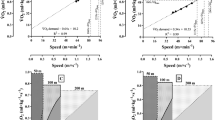Abstract
To determine the daily energy requirement of elite synchronized swimmers during moderate-intensity training, the average daily energy expenditure measured by the doubly labeled water method, was calculated for nine female Japanese national team synchronized swimmers [four senior; mean (SD) 22.5 (1.0) years old, 52.2 (3.6) kg, and five junior; 17.6 (1.1) years old, 52.8 (2.3) kg]. Their total energy expenditure (TEE) was 11.5 (2.8) MJ · day−1 [2738 (672) kcal · day−1]. When compared with estimated energy requirements derived from “Recommended Dietary Allowances for the Japanese”, 12.1 (0.6) MJ · day−1 [2897 (139) kcal · day−1], there was no difference between mean actual and estimated energy requirements. However, there were considerable differences observed on an individual basis. Their energy intake, estimated from 7- day self-reported dietary records, was 8.9 (1.7) MJ · day−1 [2128 (395) kcal · day−1], which was significantly lower than their TEE (P < 0.05). Resting energy expenditure (REE), as determined by indirect calorimetry, was 5.2 (0.3) MJ · day−1 [1247 (75) kcal · day−1]. Their physical activity level (TEE/REE) was 2.18 (0.43). These results demonstrate that the TEE values of elite female synchronized swimmers are not dissimilar to those reported for athletes participating in other sports, especially competitive swimmers during moderate-intensity training.
Similar content being viewed by others
Author information
Authors and Affiliations
Additional information
Accepted: 26 May 2000
Rights and permissions
About this article
Cite this article
Ebine, N., Feng, JY., Homma, M. et al. Total energy expenditure of elite synchronized swimmers measured by the doubly labeled water method. Eur J Appl Physiol 83, 1–6 (2000). https://doi.org/10.1007/s004210000253
Issue Date:
DOI: https://doi.org/10.1007/s004210000253





